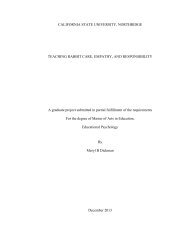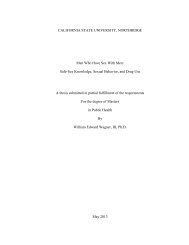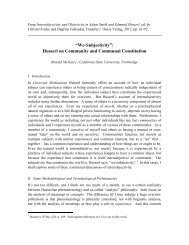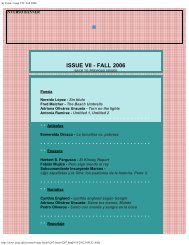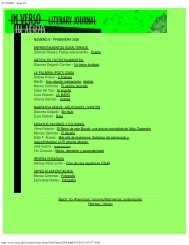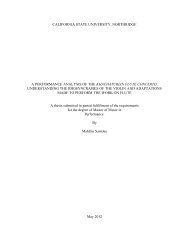Page 1 The California ""- Geographer Annual Publication of the ...
Page 1 The California ""- Geographer Annual Publication of the ...
Page 1 The California ""- Geographer Annual Publication of the ...
Create successful ePaper yourself
Turn your PDF publications into a flip-book with our unique Google optimized e-Paper software.
teaching have been <strong>of</strong> a scholarly nature, geography has pr<strong>of</strong>ited and thousands<br />
<strong>of</strong> students have been inspired. But <strong>the</strong>ir impact in <strong>the</strong> pr<strong>of</strong>ession<br />
<strong>of</strong> geography at this time seems to be at low ebb.<br />
<strong>The</strong>· second group, which I have called <strong>the</strong> diff-usionists, is a significant<br />
and well developed segment in geography that has solidified its role<br />
out <strong>of</strong> recent conflicts within <strong>the</strong> pr<strong>of</strong>ession. <strong>The</strong>se conflict lines have<br />
probably been most solidly drawn between <strong>the</strong>oretical geographers and<br />
those who see <strong>the</strong> development <strong>of</strong> culture through <strong>the</strong> diffusion <strong>of</strong> ideas<br />
within areas and regions. <strong>The</strong> word diffusion itself suggests that it is difficult<br />
to touch all <strong>the</strong> variables in a geographic problem, let alone expect to<br />
control variables or study one aspect <strong>of</strong> a problem in isolation from o<strong>the</strong>r<br />
aspects. Scholarly scrutiny <strong>of</strong> <strong>the</strong> literature (in all appropriate languages),<br />
careful field study, and analysis <strong>of</strong> <strong>the</strong> chronology <strong>of</strong> occupance mark <strong>the</strong><br />
geographers counting <strong>the</strong>mselves in this group. Diffusionists have been centered<br />
pretty largely, it seems to me, on <strong>the</strong> West Coast and have recently<br />
become much more competitive with geographers in o<strong>the</strong>r groups.<br />
A third group I have chosen to call <strong>the</strong> <strong>the</strong>orists. This group seems to<br />
have come largely from <strong>the</strong> economics-oriented geographers who have become<br />
acquainted with <strong>the</strong> successes economists have had in developing a<br />
<strong>the</strong>ory that goes with <strong>the</strong> field and who have followed developments in<br />
regional economics. <strong>The</strong>orists have found that ma<strong>the</strong>matical equations<br />
are <strong>of</strong>ten helpful in building <strong>the</strong>ory; <strong>the</strong>y have experimented with model<br />
buildings, and have generally moved nearer to many <strong>of</strong> <strong>the</strong> methods <strong>of</strong> <strong>the</strong><br />
natural sciences. <strong>The</strong>ir contributions have accelerated in recent years and<br />
have begun to show up among o<strong>the</strong>r groups <strong>of</strong> geographers. <strong>The</strong> significance<br />
<strong>of</strong> <strong>the</strong>ir position in <strong>the</strong> pr<strong>of</strong>ession was evidenced when at <strong>the</strong> "kick-<strong>of</strong>f"<br />
meeting <strong>of</strong> <strong>the</strong> recent national geography convention in Columbus, Ohio<br />
<strong>the</strong> topic was "<strong>The</strong> Spatial Organization <strong>of</strong> Economic Activity."<br />
Economics, with its multitude <strong>of</strong> data in <strong>the</strong> behavior-generating<br />
mediums <strong>of</strong> exchange, stands out among <strong>the</strong> social sciences in <strong>the</strong>ory<br />
building. Jevons described such data in this way: "A unit <strong>of</strong> pleasure or<br />
<strong>of</strong> pain is difficult even to conceive; but it is <strong>the</strong> amount <strong>of</strong> <strong>the</strong>se feelings<br />
which is continually prompting us to buying and selling, borrowing and<br />
lending, labouring and resting, producing and consuming; and it is from<br />
<strong>the</strong> quantitative effects <strong>of</strong> <strong>the</strong> feelings that we must estimate <strong>the</strong>ir comparative<br />
amounts."2 Fur<strong>the</strong>rmore, it has a long history <strong>of</strong> <strong>the</strong>oretical development<br />
from <strong>the</strong> early seventeenth century to <strong>the</strong> present.<br />
<strong>The</strong> geographer <strong>the</strong>orists, with far less historical assistance, are putting<br />
toge<strong>the</strong>r a cogent <strong>the</strong>ory <strong>of</strong> geography. <strong>The</strong>y are producing a new<br />
organization <strong>of</strong> <strong>the</strong> field. <strong>The</strong>y are classifying variables in such a way as to<br />
discover <strong>the</strong>ir behavior under model conditions. <strong>The</strong>y are selecting and trying<br />
methods from o<strong>the</strong>r disciplines that lead in both <strong>the</strong>oretical and<br />
applied aspects <strong>of</strong> <strong>the</strong>ir field. .<br />
From this <strong>the</strong>orist group comes ano<strong>the</strong>r segment which depends to a<br />
very large extent on handling numbers for its research. Perhaps an ap-<br />
2 William S. Jevons, <strong>The</strong> <strong>The</strong>ory <strong>of</strong> Political Economy, (New York: Mac<br />
Millan, 1871-1879) p. 12.<br />
16



